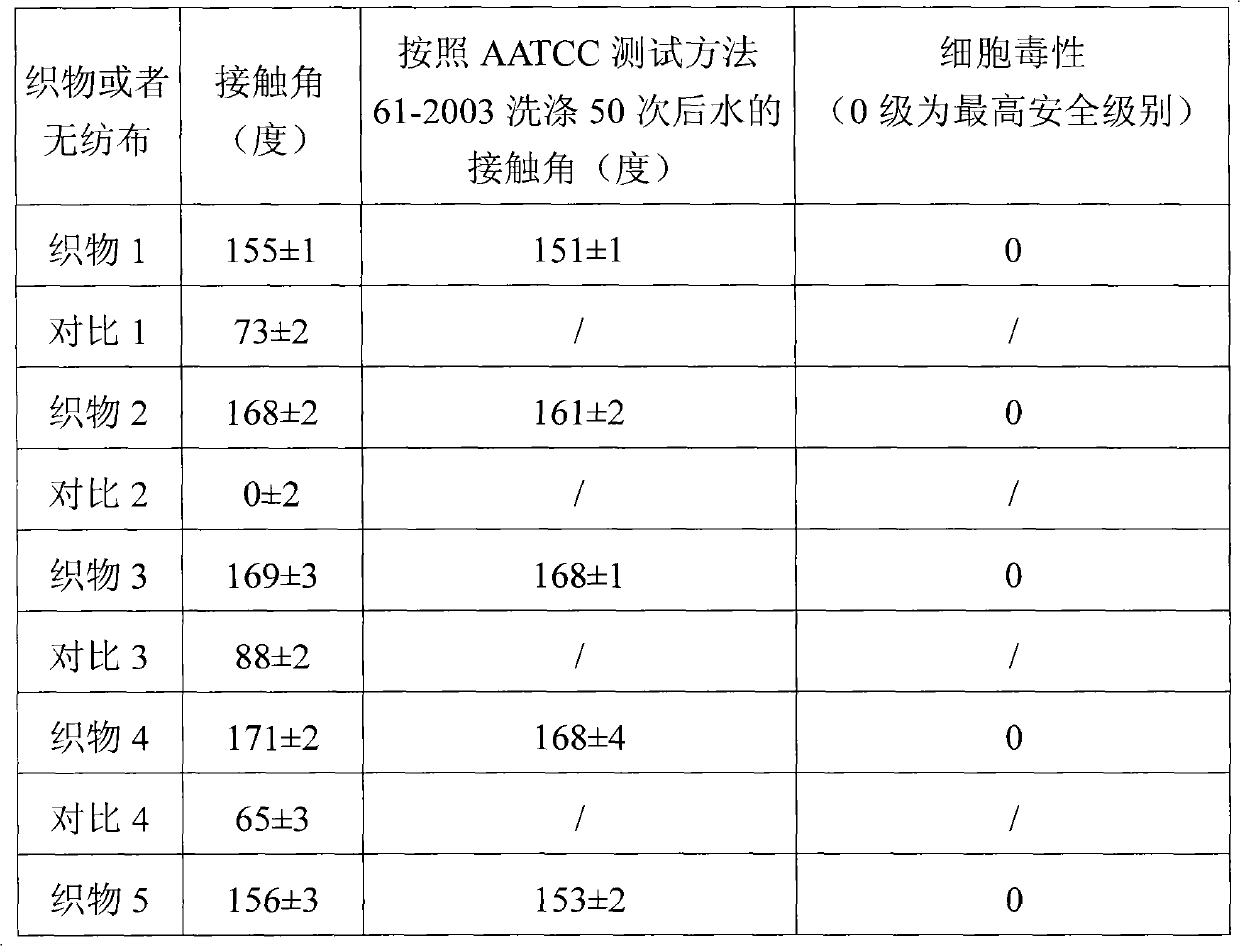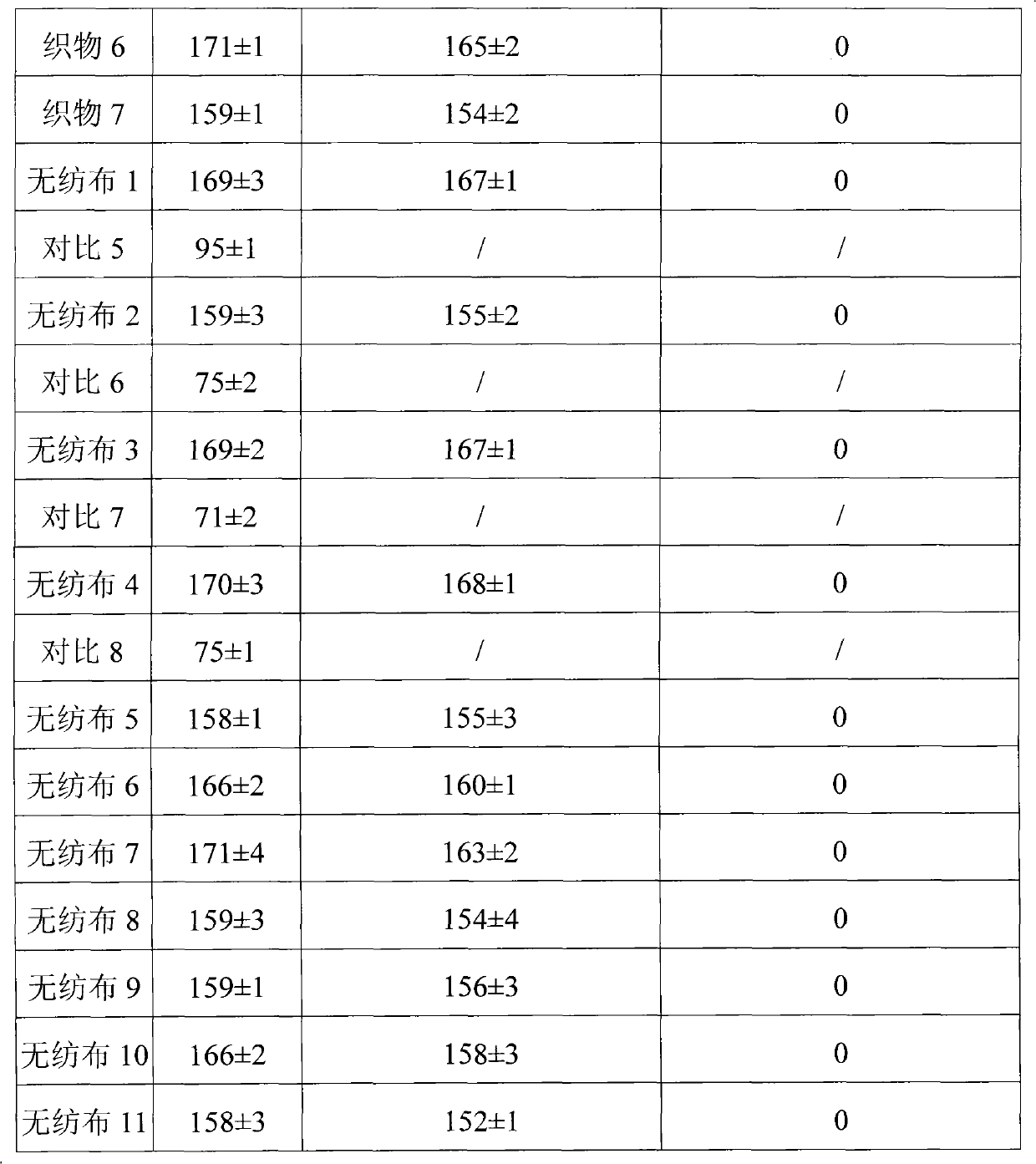Superhydrophobic fabric or superhydrophobic non-woven fabric and preparation method thereof
A super-hydrophobic, non-woven technology, applied in textiles, papermaking, fiber processing, etc., can solve the problems of complex preparation process of super-hydrophobic fabrics or super-hydrophobic non-woven fabrics, short duration of modification effect, and inability to wash. Achieve the effect of avoiding large-scale equipment, good market prospects and low prices
- Summary
- Abstract
- Description
- Claims
- Application Information
AI Technical Summary
Problems solved by technology
Method used
Image
Examples
Embodiment 1
[0030] The preparation of embodiment 1 superhydrophobic PET fabric (fabric 1)
[0031] The PET (weight-average molecular weight = 300,000) fabric was ultrasonically cleaned in ethanol and water for 3 minutes, and then vacuum-dried at 60° C. to constant weight. Put 5g PET fabric into the container containing long chain alkane monomer (CH 2=CHC(O)O(CH 2 ) 10 CH 3 ) of ethanol solution 100mL (the concentration of the monomer in the ethanol solution containing the monomer is 2wt%) glass Erlenmeyer flask, nitrogen gas 10min after airtight, in 60 After irradiating 5kGy in the Co cobalt source, the fabric was taken out and extracted in a Soxhlet extractor for 72 hours with methyl ethyl ketone as a solvent, and then vacuum-dried to constant weight at 60°C to obtain a superhydrophobic PET fabric (fabric 1), which contained The grafting ratio of long-chain alkane monomer was 11.3%.
[0032] After the prepared fabric 1 was washed 50 times according to AATCC test method 61-2003, the ...
Embodiment 2
[0037] The preparation of embodiment 2 superhydrophobic cotton fabrics (fabric 2)
[0038] The cotton fabrics were ultrasonically cleaned in ethanol and water for 3 minutes, and then vacuum-dried at 60 °C to constant weight. 5g cotton fabric is put into containing long-chain alkane monomer (CH 2 =C(CH 3 )C(O)O(CH 2 ) 17 CH 3 ) of methanol solution 100mL (the concentration of the monomer in the methanol solution containing the monomer is 10wt%) glass Erlenmeyer flask, nitrogen gas 20min after airtight, in 60 After irradiating 25kGy in the cobalt source, the fabric was taken out and extracted in a Soxhlet extractor for 72 hours with methyl ethyl ketone as a solvent, then vacuum-dried to constant weight at 60°C to obtain a superhydrophobic cotton fabric (fabric 2), which contained The graft ratio of long-chain alkane monomer is 22.0%.
[0039] Test the contact angle of fabric 2, and the test method is the same as that in Example 1. The measurement results show that the ave...
Embodiment 3
[0042] The preparation of embodiment 3 superhydrophobic polypropylene fabric (fabric 3)
[0043] Hydrophobic polypropylene (weight-average molecular weight = 400,000) fabrics were ultrasonically cleaned in ethanol and water for 3 minutes, and then vacuum-dried at 60° C. to constant weight. Put 5g polypropylene fabric into the container containing long chain alkane monomer (CH 2 =C(CH 3 )C(O)O(CH 2 ) 16 CH 3 ) of ethanol solution 100mL (the concentration of the monomer in the ethanol solution containing the monomer is 50wt%) glass Erlenmeyer flask, nitrogen gas 30min after airtight, in 60 After irradiating 50kGy in the Co cobalt source, the fabric was taken out and extracted in a Soxhlet extractor for 72 hours with methyl ethyl ketone as a solvent, then vacuum-dried at 60°C to constant weight to obtain a superhydrophobic polypropylene fabric (fabric 3), which contained The grafting rate of long-chain alkane monomer is 37.4%.
[0044] The contact angle of the prepared fabr...
PUM
 Login to View More
Login to View More Abstract
Description
Claims
Application Information
 Login to View More
Login to View More - R&D
- Intellectual Property
- Life Sciences
- Materials
- Tech Scout
- Unparalleled Data Quality
- Higher Quality Content
- 60% Fewer Hallucinations
Browse by: Latest US Patents, China's latest patents, Technical Efficacy Thesaurus, Application Domain, Technology Topic, Popular Technical Reports.
© 2025 PatSnap. All rights reserved.Legal|Privacy policy|Modern Slavery Act Transparency Statement|Sitemap|About US| Contact US: help@patsnap.com


